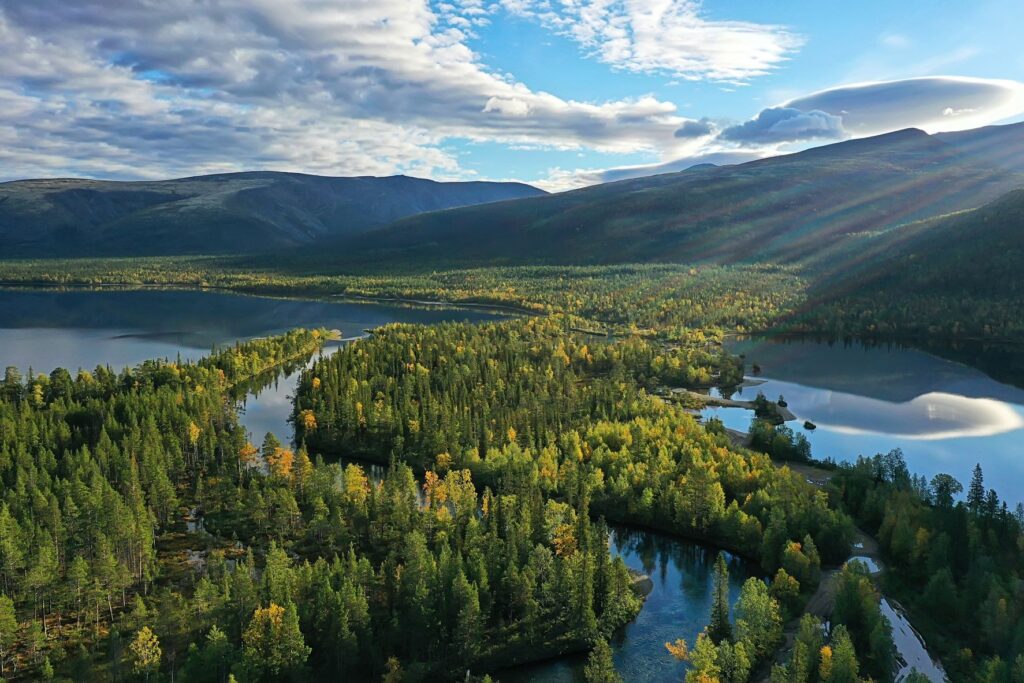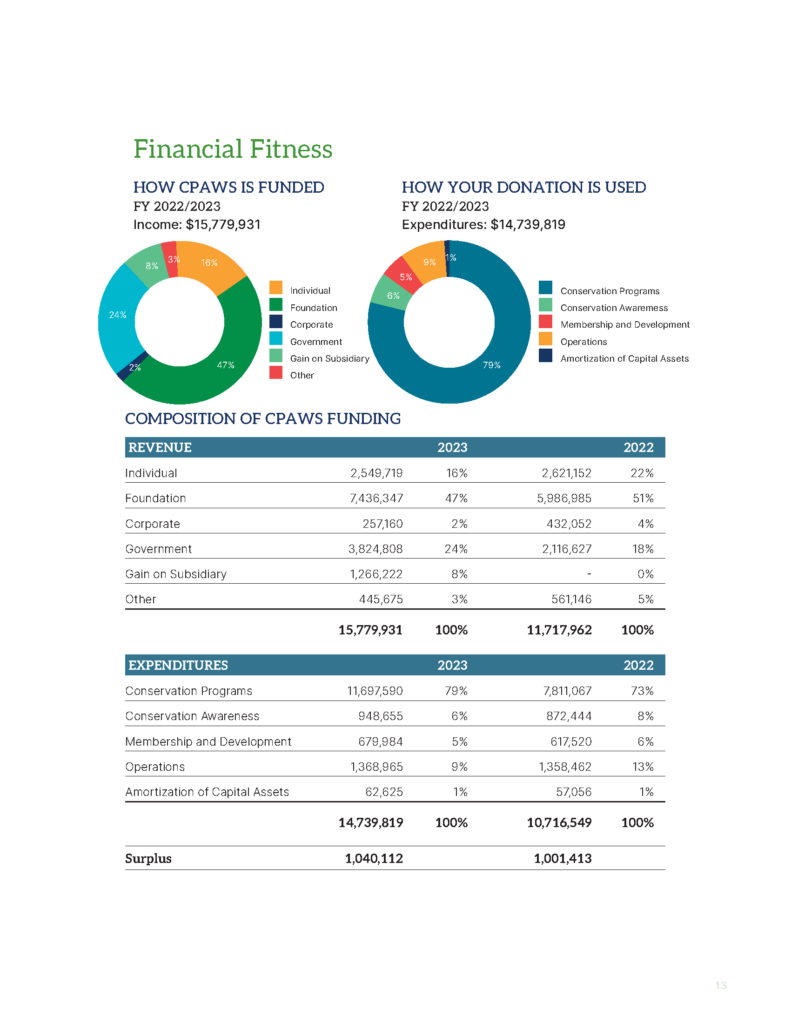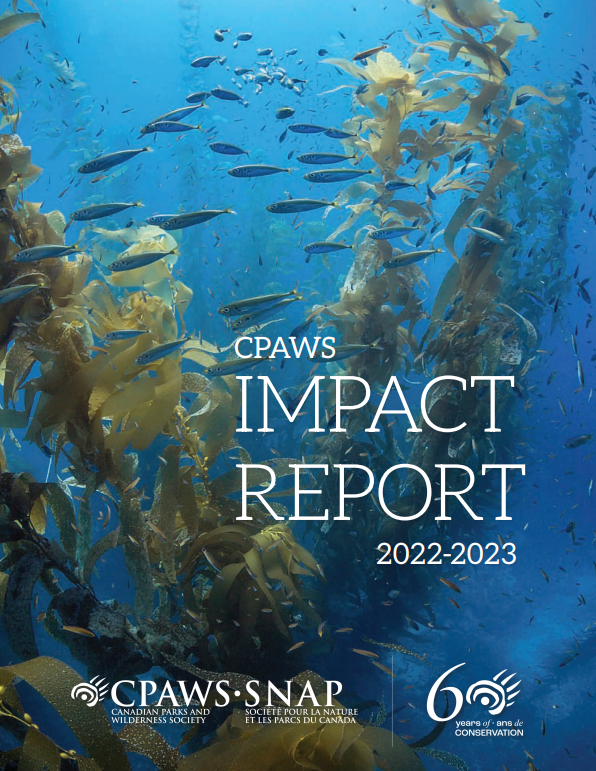CPAWS has accomplished a lot over the past 60+ years and has played a pivotal role in strengthening Canadians’ relationship with our natural environment. Below is just a sampling of the recent successes that have brought us to where we are today.
Acknowledging CPAWS’ responsibility to reconciliation and healing
Reconciliation is about balance and healing between Indigenous and non-Indigenous Peoples to form new relationships based on respect, reciprocity, equality, and trust. As an environmental organization that is settler-founded, our ways of operating have been, and are currently, influenced by the norms and customs that have been forcibly imposed since the European colonization of Canada.
CPAWS humbly acknowledges its responsibility to support First Nations, Metis & Inuit in Canada to safeguard the land, water, and air for future generations. Underlying all our work with governments and the public is a foundation of support for Indigenous leadership in conservation.
Over the last year, CPAWS has prioritized bringing together Indigenous and non-Indigenous leaders to explore the many ways we can work together on delivering nature-positive outcomes across the country.
In Fall 2022, we hosted a Parliamentary reception for decision-makers and key influencers with attendance and opening remarks from the federal Minister of Environment. We were honoured to be joined by Indigenous leaders from Alberta, Saskatchewan, Manitoba, Ontario, and Newfoundland and Labrador, who brought their conservation visions to life through an evening of networking, videos, and storytelling.
In Winter 2022, the CPAWS team co-organized three successful COP 15 events focused on Indigenous-led conservation, including a side event on advancing IPCAs (Indigenous Protected and Conserved Areas) on land and ocean.
Across the country, CPAWS chapters continue to work closely with Indigenous partners to drive regional conservation efforts and targeted campaigns. Continued learning by non-Indigenous staff about the history and current lived experiences of Indigenous Peoples in Canada is foundational work that supports CPAWS’ mission to protect nature. It is a small but crucial step in support of reconciliation.
The national board and office have committed to ongoing training as well as regular evaluations. Regularly evaluating our operational areas and programs allows us to assess where we can do more to strengthen how we work alongside our Indigenous staff and partners. This includes, among other approaches, using our resources as an ENGO to support the stewardship efforts of Indigenous partners, communities, and organizations.
CPAWS recognizes that we will not reach our conservation targets without acknowledging the critical value of Indigenous Knowledge systems. We are committed to respecting this Knowledge alongside the concepts of Western Science and Western Knowledge. Only by working together and centering Indigenous-led conservation will Canada achieve its nature protection targets.
Conservation wins and advancements
(April 1, 2022 – March 31, 2023)
The work of conservation is both essential, collaborative, and ongoing. Highlighting our wins allows us to celebrate the protection of nature together. After all, CPAWS can’t do it alone, and collaboration is the true engine that powers our campaigns and initiatives. COP 15 and IMPAC5 were two momentous events that took place in Canada in 2022-2023. Both benefited from a consistent and concerted effort at both the regional and national level that is CPAWS’ unique strength.
This collaboration set the foundation for accelerated impact in the form of agreements and announcements. It took unprecedented efforts and leadership by many partners to convene global, national, and provincial governments as well as Indigenous and civil society leaders to work together to commit to protecting 30 percent of land and ocean by 2030, and the resulting wins are worth celebrating.
Many of the announcements made by federal and provincial/territorial governments and Indigenous nations at (or in parallel with) COP 15 were pushed for, led, contributed to, or supported by CPAWS throughout the year. They include funding for Indigenous community planning, over 1B in investments, which includes $800M in federal funding to be be rolled out in support of 4 Indigenous-led conservation initiatives, over a dozen new protected areas, as well as a biodiversity action plan.
Meanwhile, CPAWS successes continued across the country...
A potential Indigenous Protected Area (IPA) is now under study in Manitoba. The Seal River Watershed Alliance, the Government of Canada, and the Government of Manitoba committed to working together to conduct a feasibility study towards establishing an Indigenous Protected Area in the Seal River Watershed. Sayisi Dene First Nation is leading the initiative to protect the entire watershed from industrial activity in partnership with Northlands Denesuline First Nation, O-Pipon-Na-Piwin Cree Nation, Barren Lands First Nation and their Inuit neighbours, as well as with support from the Manitoba chapter of CPAWS.
In British Columbia, two important IPAs were declared by their respective nations. Sməlqmíx, the syilx people of the Similkameen Valley announced the designation of a new Indigenous Protected Area in their territory: Ashnola sməlqmíx Protected Area in the threatened grasslands of BC. Wilps Gwininitxw, a Gitxsan Nation house group announced the Gwininitxw Indigenous Protected Area in the Upper Skeena watershed.
At IMPAC5 in February, the Great Bear Sea MPA Network Action Plan was approved by 15 First Nations, British Columbia, and Canada. The Department of Fisheries and Oceans and First Nations announced the proposed Tang.ɢ̲wan — ḥačxʷiqak — Tsig̱is MPA (formerly referred to as the deep sea oasis) would be going to public consultation with final designation expected in the fall. Additionally, the province unveiled a discussion paper for consultation on the development of a BC Coastal Strategy. Spearheaded by CPAWS and West Coast Environmental Law, the strategy will hopefully support Indigenous leadership and governance and strengthen provincially designated coastal and marine protected areas.
The Yukon government as well as the federal government have signed a Nature Agreement that includes a commitment to protecting 25% of land and ocean by 2025 while working towards 30 by 30. The agreement commits to funding for Indigenous community planning. Also in Yukon, CPAWS was involved in a campaign to protect Chasàn Chùa (also known as McIntyre Creek) in Whitehorse. The City of Whitehorse is working with the Government of the Yukon to protect the area, having recently removed a proposed roads and housing development from their Official Community Plan. The establishment of this protection also increased the existing boundary of the prohibited area for quartz mining and staking around the city and the Chasàn Chùa protected area.
The province of Quebec is investing $650M to ensure the protection of 30% of land and ocean by 2030. SNAP Quebec signed several agreements under l’Initiative Plein Aire and obtained the protection of Mount Kaaikop in the Laurentian region. The work done by SNAP Quebec has also allowed for the expansion of the Saguenay-St. Lawrence Marine Park. CPAWS Ottawa Valley also made additional progress toward the permanent protection of at least 1115 km² of the Noire River and the Coulonge River watersheds thanks to funding from Environment and Climate Change Canada (ECCC) and the Quebec Government. We also partnered with the community of Kitigan Zibi to help conduct field work and are in discussions with the community about potential IPCA designation for all or part of the territory. Another project aims to connect Ottawa Valley’s two largest protected areas: Algonquin Park in Ontario and the Dumoine River Aquatic Reserve in Quebec, which straddle two provinces but are separated by only 18 km.
Meanwhile in Nova Scotia, an additional $20M in funding from the federal government will be disbursed to advance towards 20% land and ocean protection targets. The Nova Scotia chapter of CPAWS successfully defended West Mabou Beach Provincial Park from a proposed golf course development in Cape Breton. CPAWS NS accomplished this through targeted scientific fieldwork which led to the discovery of a new species. Additionally, the identification of numerous rare and endangered species at Archibald Lake in Guysborough County will help create the conditions for legal protection to stop a proposed open pit gold mine.
In the Northwest Territories, Deninu Kųę́ First Nation (DKFN) and Fort Resolution Métis Government (FRMG) have reached a $3.1M federal investment to support the Slave River Delta/Talston Indigenous Protected and Conserved Area (IPCA). This work was supported by the CPAWS NWT chapter.
In Alberta, we are encouraged by the work led by the Mikisew Cree First Nation with support from CPAWS Northern Alberta. Their project brought an official designation of the expansion to the Kitaskino Nuwenene Wildland Provincial Park. Meanwhile, we helped facilitate a dialogue with the UN Reactive Monitoring Mission (RMM) about the Wood Buffalo National Park World Heritage Site. Although the RMM’s report does not currently recommend that the Park be added to the list for World Heritage in Danger, it does encouragingly request another investigation in 2026. We also helped inform the updated list of recommendations prepared by the RMM to improve the state of the park. Another important Albertan park deserves to be mentioned as a win for conservation. As of 2023, Banff National Park made the courageous decision to close the Moraine Lake Road to private vehicles to help protect wildlife.
Finally, the Newfoundland and Labrador chapter of CPAWS welcomed an agreement between Canada and the province to accelerate the creation of new protected areas, including the South Coast Fjords national marine conservation area (NMCA) and potential adjacent national park. CPAWS NL also launched the Marine Data Hub. The hub is a resource now utilized by the public, academia, and various government agencies to identify areas for conservation potential and opportunities. The local chapter of CPAWS also took the lead on two potential national marine wildlife areas within the province (one in Witless Bay and one in Cape St. Mary’s), bolstering our relationships with community stakeholders, other environmental non-governmental organizations, and various governmental agencies.
This year has proven to be a time of reaffirmed commitment to collaboration and progress that we have great hopes will continue as we work to help Canada meet its commitment to protect 30% of land and water across the country by 2030.
Thank you for all you have done in support of CPAWS and in support of conservation.

High-quality permanent protection is possible with investment and political will
It is with enthusiasm that CPAWS approaches the upcoming year. Though 2023 was marked by a changing climate and the impacts of wildfires, we are encouraged by the collaborative momentum toward applying our recommendations for nature protection. As released in our Roadmap to 2030: Delivering on Canada’s Land and Ocean Protection Targets report, the recommendations outline a concrete path forward for Canada to reach its conservation targets to protect 30% of land and ocean by 2030. This roadmap identifies dozens of high-impact opportunities for protection across Canada, both on land and in the ocean, and we know there are more opportunities emerging across the country.
These opportunities include ongoing or already committed-to land use and/or conservation planning processes, as well as many Indigenous-led conservation initiatives. If all the prospective sites are approved and designated by 2030, the country would more than double currently protected land from 13.5% to 29.3% – just shy of the 30% target – and marine protected areas would increase from 13.9% to 30.4% – surpassing the 30% target. CPAWS is committed to the path forward, and we thank our supporters and partners without whom this work would not be possible.
We have witnessed concrete steps from all levels of governments, community leaders, corporations and ENGOs to follow these recommendations and we are confident we will see additional progress in the new year.
Yours in Conservation,

Sandra Schwartz
CPAWS National Executive Director

John Grandy
President, Board of Trustees
Financial Fitness
CPAWS works hard to maximize the proportion of revenue spent on our wilderness work. Our goal is a sustainable financial foundation for our conservation efforts, and sustained protection of Canada’s wilderness.
Each year, our 13 chapters and the national office devote over 70 per cent of its budget to conservation and education, spending less than 15 per cent on fundraising costs.
As the world continued to face economic uncertainty, CPAWS donors continued to demonstrate their trust in our efforts and in fact increased their support for our conservation work. With a significant increase in support from institutional donors, CPAWS received $15,779,931 in funding, allowing us to focus 79% of our spending exclusively on conservation. Our partners and stakeholders can be confident CPAWS remains financially stable and focused on our mission.
It is also worth noting that total revenue included a gain of $1,266,222 from CPAWS’ investment in our wholly owned subsidiary, which reported an extraordinary income in 2022 as a result of the sale of the office building CPAWS currently occupies. This onetime income is not expected to repeat in
the foreseeable future.

Laura Cui
National Director, Finance

Honouring Our Donors
Thank you to those individuals, foundations, corporate donors, corporate partners, and organizations that demonstrated their leadership in our 2022-2023 fiscal year with gifts and contributions to CPAWS of $1,000 or more. For a list of donors, click here.


